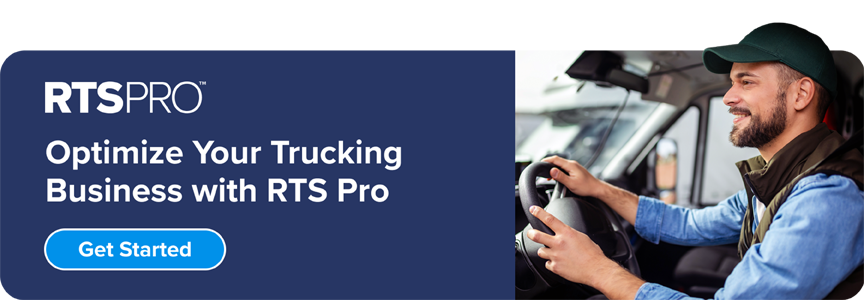
According to the 2022 report from the American Trucking Research Institute (ATRI), the operational cost of trucking in 2021 increased to its highest level: $1.855 per mile. Further, C.H. Robinson, one of the largest logistics platforms in the U.S., offers a 2023 forecast that has the average cost of trucking at $1.74 per mile over the summer and then increasing to $1.88 per mile by the end of 2023.
It’s important to note that when considering the average cost per mile to operate a truck, the statistics provided are national averages and calculated with data from owner-operators to large fleets. Each carrier will have a different cost to operate based on several variables. As a quick note, you want to make sure all the loads you accept are profitable. So, generally speaking, dividing your rate by the total miles for the trip should get a number above your current operating cost per mile, or use the industry average as a benchmark. Need help calculating your cost per mile?
When considering your operating costs, the largest are often fuel, insurance and equipment maintenance, but you also have to look out for unplanned or unexpected costs like empty miles or out-of-service time. Knowing what to expect, preventing unnecessary or unexpected expenses and looking for ways to save money will help you reduce costs overall and maximize profit.
Let’s take a look.

Planned Costs
Fuel: As mentioned above, fuel is one of the biggest expenses in trucking. Diesel can rack up over 20 percent of your operating costs. A single truck goes through upwards of 12,000 gallons per year, which can cost more than $45,000 depending on current fuel prices. And, as we saw during the height of the pandemic and after the war in Ukraine started, fuel prices can rise dramatically in no time.
Insurance: Insurance is another large expense in trucking. The cost of commercial trucking insurance can vary widely depending on a number of factors, including the size and weight of the commercial truck, the nature of the goods being transported, the driving record of the drivers, how long the company has been in business and their geographic location (which state they operate out of). On average, when a carrier has all lines of coverage and accounts for the insurance down payment, which is usually 10 – 15% of the annual premium, the cost of commercial truck insurance can range from $16,000 to $25,000 per year per truck. It’s important to remember this is a rough estimate, though, and the actual cost can be significantly higher or lower depending on the specific circumstances of the trucking company.
Equipment Maintenance: Vehicle maintenance is another expected (but still frustrating) cost of doing business. Trucks have lots of parts that wear out regularly, like air lines and hoses, alternators and tires. And that’s on top of regular maintenance like tune-ups, oil changes etc. Letting those routine jobs go for too long can result in even more expensive repairs down the line.
Other costs and fees that grab smaller pieces of your budget individually can add up to big costs over the course of a year. These include vehicle licensing, tolls, inspection fees and taxes.
Unplanned Costs
Some expenses involved in operating a trucking company aren’t as obvious. For example, dead-head, or non-revenue generating miles, might not be on your radar as an expense, but empty miles use fuel and driver time even when there’s no cargo to offset your costs.
Another big area of concern is downtime or out-of-service time. This wasted time can come from a vehicle getting repairs or maintenance, or from drivers waiting at pick-up or drop-off locations to get loaded or unloaded.
Cargo theft, especially the sneakier methods like leakage (in which you might not notice losses until they’ve already added up) also eats into your profits. According to Transport Topics, companies lost upwards of $223 million to theft in 2022.
From these examples to other less obvious costs like ongoing safety and driver training, there are a lot of directions your money goes before it lands in the profit column of your balance sheet.
Keeping Trucking Costs Down
Want to keep your costs down and your profits up? You can take several steps to optimize your operations:
- Document costs thoroughly and create metrics that help you track costs and spot areas for optimization. There are tools and trucking apps that can help you keep everything organized and easily accessible.
- Reduce dead-head miles. Picking up containers at the same time as dropping off a new load, setting up as a for-hire provider to fill capacity for return trips and optimizing delivery routes and schedules can all help you minimize the time spent hauling empty trailers around.
- Stay on top of fleet maintenance to avoid critical breakdowns that cost a lot more to repair. Finding a program that offers service and maintenance discounts can help trim costs, which can add up over time.
- Provide ongoing training for drivers and other employees to ensure best practices and more efficient processes. And don’t neglect safety training – by establishing documented safety policies, training your employees on them regularly and using tools like cell phone blocking apps and driver scorecards, you can save a bundle on insurance.
- Look for ways to save money on your biggest operating expenses. For example, a fuel card program that offers discounts on diesel fuel can save you thousands of dollars every year.
- Maintain a healthy cash flow and avoid risky lending practices. If you need help maintaining your cash flow, avoid high-risk, predatory loans like merchant cash advances, and instead, opt for more regulated and stable financial solutions like trucking factoring from a reputable company.
With a clearer picture of all expenses, you can create a much more effective plan to minimize costs and maximize profit.
Need help saving money and streamlining your operations? RTS offers industry-leading factoring, fuel cards, trucking technology and additional services offered through our industry partnerships.